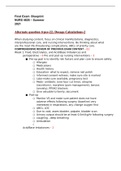Final Exam Blueprint NURS 4626 – Summer 2021
Alternate question types-22; Dosage Calculations-2
When studying content, focus on clinical manifestations, diagnostics, interprofessional care, and nursing interventions. Be thinking about what are the most life-threatening complications, ABCs of priority care.
COMPREHENSIVE REVIEW OF PREVIOUS EXAM CONTENT – 61
Week 1. Fluid, Electrolytes, and Acid/Base Imbalances and perioperative – 6 Pre and post op nursing interventions – 3
●Pre-op goal is to identify risk factors and plan care to ensure safety
○Allergies
○Medications
○Health history
○Education- what to expect, remove nail polish
○Informed consent-witness, make sure site is marked
○Labs-make sure available, pregnancy test
○Meds- antibiotic (one hour cut time), atropine (secretions), morphine (pain management), benzos (anxiety), PPI/H2 blockers
○Give valuable to family, document
●Post-op
○Monitor VS and make sure patient does not have adverse effects following surgery (baseline) very interested in respirations, any change oxygen first
○ABCs, LOC
○Due to void, asses bladder, palpate, bladder scan
○Urinary output should be at least 0.5ml/kg/hr following surgery
○coughing , deep breathing
○Ambulation
○
Acid/Base Imbalances – 2 Hemodynamic monitoring - 1
●Arterial line- more accurate
●CVP 0-8, with shock we want 12-15, in cardiogenic shock we want it lower than 8
●Map 70-110 must do interventions when <60
●Pulse pressure 40-
60 Week 2. Dysrhythmias – 6
ECG identification and treatment – 4
●Sinus Bradycardia:
○Fires at a rate less than 60 beats/min
○Could be normal for athletes and when some people sleep
○Common disease states associated with bradycardia are hypothyroidism, increased intracranial pressure and MI
○Treatment: If due to drugs, these may have to be held, stopped or reduced, for the patient with symptoms, treatment consists of giving IV atropine. Patient may need a pacemaker
●Sinus Tachycardia:
○The sinus rate is 101-180 beats/min
○Associated with exercise, fever, pain, hypotension, hypovolemia, anemia, and hypoxia
○It can be an effect of drugs such as epinephrine, norepinephrine, atropine and caffeine
○s/s: Dizziness, dyspnea, and hypotension because of decreased cardiac output




